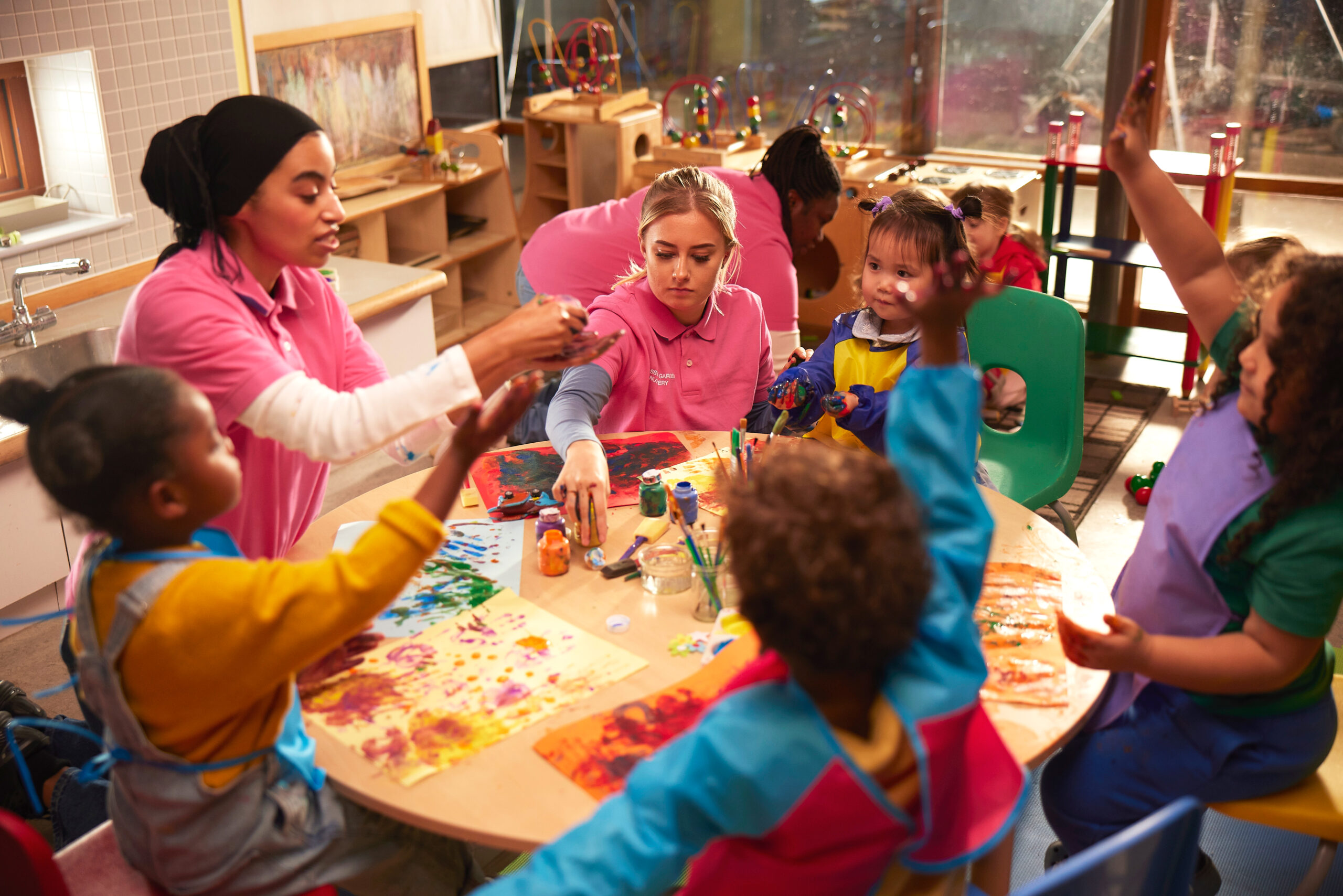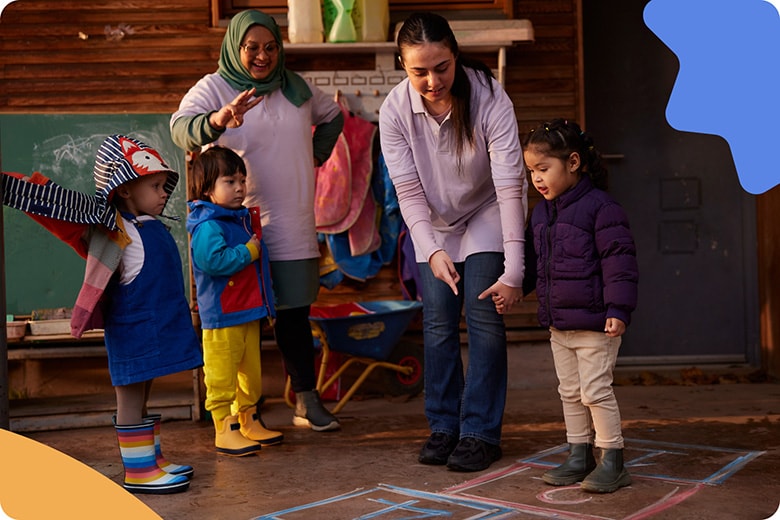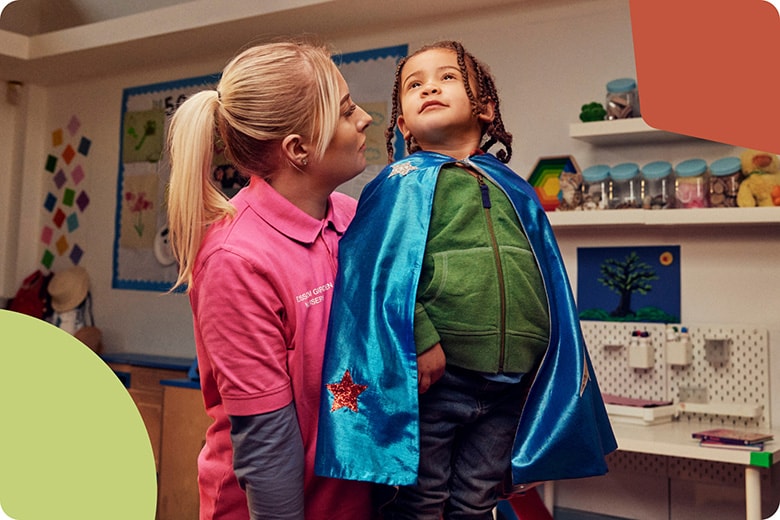Work in a pre-school or nursery school

Just like in a nursery, working with pre-school children is so rewarding. You get to see them learn and flourish and set them up for the future. It’s also an opportunity to work term-time only and fit your job around your life.
What you’ll do
The work you do in a pre-school or maintained nursery school will vary depending on its size and set up, and more importantly on the ages and personalities of the children. Your role will be to:
- provide early education in a safe, fun, engaging environment
- support children with their learning and development, getting them ready for school
You’ll generally work with young children aged 3 to 5. You may also get to work with children with additional needs.
Different pre-schools and maintained nursery schools offer different working patterns so you may be able to find one that’s right for you. Many pre-schools and maintained nursery schools will mirror school opening hours. This may mean that term-time jobs are available.
What you’ll need
Each vacancy will include information about the experiences, skills and qualifications you’ll need for that role.
Some jobs in pre-schools won’t need a specific early years qualification. You can apply directly for these roles and start working straight away.
However, there are roles that you’ll need approved qualifications for. Find out more about training and qualifications.
Anyone working in a pre-school will need to pass enhanced DBS checks.
Apply now
There are thousands of pre-schools out there and lots of opportunities to explore.
Different roles you could do
There are so many types of roles you could do in a nursery to play your part in a child’s early education.
Be a pre-school assistant
You might see pre-schools or maintained nursery schools advertising for ‘pre-school assistants’, ‘pre-school practitioners’ or similar. These roles involve working as part of the team to help educate and care for the children who attend. This may involve:
- running play and learning activities that help children develop
- helping children feel settled
- keeping the nursery clean and safe
- supporting the long-term progress of children to set them up for school
- being a key person for specific children
You may not need specific early years qualifications, although some jobs might require an approved level 2 qualification (equivalent to GCSEs). You can get these through a range of training providers. To earn while you learn, consider doing an early years practitioner level 2 apprenticeship.
To find out what training is available where you live, speak to your local college, training provider or careers service.
Be a senior team member or team leader
You might see pre-schools and maintained nursery schools advertising for things like ‘pre-school practitioners (level 3)’ or ‘pre-school room leaders’. These roles will often involve leading what happens in specific rooms. This could be:
- supervising other team members
- planning and leading activities that help children learn and develop
- being a key person for specific children
- shaping each child’s learning experience based on their individual personalities and needs
- supporting the long-term progress of children to set them up for school
Qualifications
You’ll likely need an approved level 3 qualification for these types of roles (equivalent to A Levels) and a level 2 qualification in English (equivalent to GCSEs). You can get these through a range of training providers. To earn while you learn, consider doing an early years educator level 3 apprenticeship.
There are also other, more advanced qualifications you could work towards if you want to take your career to the next level. For example,
- a T Level in education and early years (broadly equivalent to 3 A Levels)
- an early years lead practitioner level 5 apprenticeship (equivalent to the second year of a degree)
- early childhood studies or early years education degrees
These may enable you to take on more specialist or leadership roles in a pre-school or maintained nursery school, like leading on the curriculum. To find out what training is available where you live, speak to your local college, training provider or careers service.
Become an early years teacher
An early years teacher will work with children aged 0 to 5 to help them learn and develop. This helps to prepare them for school. It may involve:
- creating lesson plans
- encouraging a child’s learning and development using stories, games and visual aids
- monitoring and recording a child’s progress and reporting any issues
- taking a lead in supporting other team members in their implementation of effective education and care
Qualifications
To work as an early years teacher, you’ll need to:
- complete early years initial teacher training to achieve early years teacher status
- meet the early years teachers’ standards
There are 2 ways to train to become an early years teacher, either as:
- a postgraduate if you already have a degree
- part of an undergraduate degree
To do postgraduate training, you’ll need a bachelor’s degree or an equivalent. For example, a vocational, professional, or overseas qualification.
To start early years teacher training, you’ll need 4 or 5 GCSEs at grades 9 to 4 (A* to C), or equivalent. This includes English, maths and science. Find out more about becoming an early years teacher.
Be a manager
With additional experience, senior team members and team leaders can become the pre-school manager. This may involve:
- leading the creation of a safe and stimulating environment that helps children learn and develop
- recruiting staff and developing your team
- managing budgets
- making sure the pre-school meets safety and child protection regulations
- keeping parents and carers updated about their child’s progress
- overseeing the development and learning of children
Qualifications
You’ll usually need at least an approved level 3 qualification (equivalent to A Levels) and 2 years’ experience working with young children. You must also hold a suitable level 2 qualification (equivalent to GCSEs) in maths or must achieve one within 2 years of starting in the position.
You can get approved level 3 qualifications through a range of training providers. To earn while you learn, consider doing an early years educator level 3 apprenticeship.
To find out what training is available where you live, speak to your local college, training provider or careers service.
Be a special educational needs coordinator
A special educational needs coordinator plays a key role in coordinating support for children with additional needs. The role can vary depending on the size of the pre-school. It may involve:
- making sure colleagues understand their responsibilities working with children who have special educational needs
- checking the preschool’s approach to identifying and meeting special educational needs
- advising and supporting colleagues
- ensuring parents or carers are closely involved and help inform what care and education the child receives
- working with external professionals or agencies
Qualifications
To be a special educational needs coordinator in a maintained nursery school, you’ll need to have qualified teacher status. You should also have a special educational needs coordination qualification or relevant experience.
You won’t need specific qualifications or training to be a special educational needs coordinator in a pre-school.
Training and qualifications
If you would like to grow in your career and get involved in other roles, find out more about the qualifications you can take.

Real stories
Explore our bank of inspiring case study videos and blogs from real early years educators.
